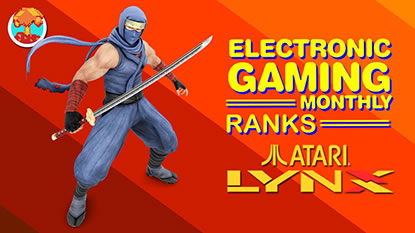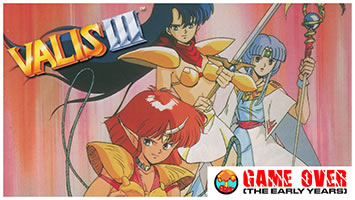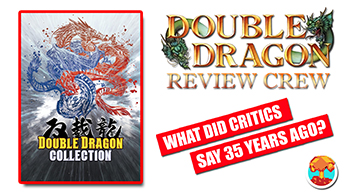- CLASSIC MAGAZINES
- REVIEW CREW
A show recapping what critics thought back
when classic games first came out! - NEXT GENERATION'S BEST & WORST
From the worst 1-star reviews to the best
5-stars can offer, this is Next Generation! - NINTENDO POWER (ARCHIVE)
Experience a variety of shows looking at the
often baffling history of Nintendo Power! - MAGAZINE RETROSPECTIVE
We're looking at the absolutely true history of
some of the most iconic game magazines ever! - SUPER PLAY'S TOP 600
The longest and most ambitious Super NES
countdown on the internet! - THEY SAID WHAT?
Debunking predictions and gossip found
in classic video game magazines! - NEXT GENERATION UNCOVERED
Cyril is back in this spin-off series, featuring the
cover critic review the art of Next Generation! - HARDCORE GAMER MAGAZING (PDF ISSUES)
Download all 36 issues of Hardcore Gamer
Magazine and relive the fun in PDF form!
- REVIEW CREW
- ELECTRONIC GAMING MONTHLY
- ELECTRONIC GAMING MONTHLY RANKS
From Mario to Sonic to Street Fighter, EGM
ranks classic game franchises and consoles! - ELECTRONIC GAMING MONTHLY BEST & WORST
Counting down EGM’s best and worst reviews
going year by year, from 1989 – 2009! - ELECTRONIC GAMING BEST & WORST AWARDS
11-part video series chronicling the ups and
downs of EGM’s Best & Worst Awards!
- ELECTRONIC GAMING MONTHLY RANKS
- GAME HISTORY
- GAME OVER: STORY BREAKDOWNS
Long-running series breaking down game
stories and analyzing their endings! - A BRIEF HISTORY OF GAMING w/ [NAME HERE]
Real history presented in a fun and pithy
format from a variety of game historians! - THE BLACK SHEEP
A series looking back at the black sheep
entries in popular game franchises! - INSTANT EXPERT
Everything you could possibly want to know
about a wide variety of gaming topics! - FREEZE FRAME
When something familiar happens in the games
industry, we're there to take a picture! - I'VE GOT YOUR NUMBER
Learn real video game history through a series
of number-themed episodes, starting at zero! - GREAT MOMENTS IN BAD ACTING
A joyous celebration of some of gaming's
absolute worst voice acting!
- GAME OVER: STORY BREAKDOWNS
- POPULAR SHOWS
- DG NEWS w/ LORNE RISELEY
Newsman Lorne Riseley hosts a regular
series looking at the hottest gaming news! - REVIEW REWIND
Cyril replays a game he reviewed 10+ years
ago to see if he got it right or wrong! - ON-RUNNING FEUDS
Defunct Games' longest-running show, with
editorials, observations and other fun oddities! - DEFUNCT GAMES QUIZ (ARCHIVE)
From online quizzes to game shows, we're
putting your video game knowledge to the test!- QUIZ: ONLINE PASS
Take a weekly quiz to see how well you know
the news and current gaming events! - QUIZ: KNOW THE GAME
One-on-one quiz show where contestants
find out if they actually know classic games! - QUIZ: THE LEADERBOARD
Can you guess the game based on the classic
review? Find out with The Leaderboard!
- QUIZ: ONLINE PASS
- DEFUNCT GAMES VS.
Cyril and the Defunct Games staff isn't afraid
to choose their favorite games and more! - CYRIL READS WORLDS OF POWER
Defunct Games recreates classic game
novelizations through the audio book format!
- DG NEWS w/ LORNE RISELEY
- COMEDY
- GAME EXPECTANCY
How long will your favorite hero live? We crunch
the numbers in this series about dying! - VIDEO GAME ADVICE
Famous game characters answer real personal
advice questions with a humorous slant! - FAKE GAMES: GUERILLA SCRAPBOOK
A long-running series about fake games and
the people who love them (covers included)! - WORST GAME EVER
A contest that attempts to create the worst
video game ever made, complete with covers! - LEVEL 1 STORIES
Literature based on the first stages of some
of your favorite classic video games! - THE COVER CRITIC
One of Defunct Games' earliest shows, Cover
Critic digs up some of the worst box art ever! - COMMERCIAL BREAK
Take a trip through some of the best and
worst video game advertisements of all time! - COMIC BOOK MODS
You've never seen comics like this before.
A curious mix of rewritten video game comics!
- GAME EXPECTANCY
- SERIES ARCHIVE
- NINTENDO SWITCH ONLINE ARCHIVE
A regularly-updated list of every Nintendo
Switch Online release, plus links to review! - PLAYSTATION PLUS CLASSIC ARCHIVE
A comprehensive list of every PlayStation
Plus classic release, including links! - RETRO-BIT PUBLISHING ARCHIVE
A regularly-updated list of every Retro-Bit
game released! - REVIEW MARATHONS w/ ADAM WALLACE
Join critic Adam Wallace as he takes us on a
classic review marathon with different themes!- DEFUNCT GAMES GOLF CLUB
Adam Wallace takes to the links to slice his way
through 72 classic golf game reviews! - 007 IN PIXELS
Adam Wallace takes on the world's greatest spy
as he reviews 15 weeks of James Bond games! - A SALUTE TO VAMPIRES
Adam Wallace is sinking his teeth into a series
covering Castlevania, BloodRayne and more! - CAPCOM'S CURSE
Adam Wallace is celebrating 13 days of Halloween
with a line-up of Capcom's scariest games! - THE FALL OF SUPERMAN
Adam Wallace is a man of steel for playing
some of the absolute worst Superman games! - THE 31 GAMES OF HALLOWEEN
Adam Wallace spends every day of October afraid
as he reviews some of the scariest games ever! - 12 WEEKS OF STAR TREK
Adam Wallace boldly goes where no critic has
gone before in this Star Trek marathon!
- DEFUNCT GAMES GOLF CLUB
- DAYS OF CHRISTMAS (ARCHIVE)
Annual holiday series with themed-episodes
that date all the way back to 2001!- 2015: 30 Ridiculous Retro Rumors
- 2014: 29 Magazines of Christmas
- 2013: 29 Questionable Power-Ups of Christmas
- 2012: 34 Theme Songs of Christmas
- 2011: 32 Game Endings of Christmas
- 2010: 31 Bonus Levels of Christmas
- 2009: 30 Genres of Christmas
- 2008: 29 Controls of Christmas
- 2007: 34 Cliches of Christmas
- 2006: 33 Consoles of Christmas
- 2005: 32 Articles of Christmas
- 2004: 31 Websites of Christmas
- 2003: 29 Issues of Christmas
- 2002: 28 Years of Christmas
- 2001: 33 Days of Christmas
- NINTENDO SWITCH ONLINE ARCHIVE
- REVIEW ARCHIVE
- FULL ARCHIVE
Five Controversial Facts About DJ Boy

DJ Boy (Genesis)
Welcome to Instant Expert, the show that teaches you everything you might possibly need to know about an old game series. Now you can look smart as you impress your friends with obscure trivia and your strong grasp on rare and obscure releases. With Instant Expert you will never be the loser at the office gathering that doesn't know the finer details of a game franchise nobody's heard of. We guarantee that you'll be the life of the party or we'll give you a full refund!
SERIES: DJ Boy (1989 - 1992)
GAMOGRAPHY: Kaneko only produced two DJ Boy installments in the arcade, and only one of those made its way to home consoles.
THE BASICS: It's like Double Dragon ... on roller skates. DJ Boy tells the story of a young man who uses his roller skate training to beat up the most nefarious gang in all of Cigaretch City. Like most 2D brawlers, DJ Boy involves a lot of button mashing and skating from left to right. Along the way you'll run into the usual assortment of bosses, power-ups and cloned goons. Despite seeing some controversy at the time, DJ Boy managed to successfully launch a home console port for the Sega Genesis.
 a deep-voiced talker who knows a lot about the radio game? Then you need to look elsewhere, because the hero of DJ Boy is not a professionally certified disc jockey. He's never laid down any phat beats, tinkered with a fader or owned a record player. He's just some dude on roller skates.
a deep-voiced talker who knows a lot about the radio game? Then you need to look elsewhere, because the hero of DJ Boy is not a professionally certified disc jockey. He's never laid down any phat beats, tinkered with a fader or owned a record player. He's just some dude on roller skates.
His real name is Donald J. Boy, but all of his friends call him DJ for short. He's a master roller skate fighter, kickin' it with some homies in the outskirts of NYC. When violence strikes Cigaretch City, DJ springs into action and takes on the Dark Knight gang. Phew, that was a close one. DJ Boy knows a thing or two about kicking some ass. Just imagine how awkward things would have been if he was asked to perform at Bobby's Bar Mitzvah.
To the publisher's credit, the game altered slightly when it was ported to the Sega Genesis in the United States. The woman's skin color was altered and some of her attacks were removed. Incidentally, in later cut scenes you can see that the woman is black. Regardless of whether she's black, pink or polka dotted, we shouldn't overlook the fact that Donald J. Boy just beat up an old fat woman. Surely that's a hate crime in New York!
 look closer and realize that poor Donald J. Boy is actually on TWO completely different adventures.
look closer and realize that poor Donald J. Boy is actually on TWO completely different adventures.
In the arcade our hero is part of a two-person rolling skating duo. The game starts with the team breakdancing to the freshest tunes circa 1989, when all of a sudden the Dark Knight gang swoops in and steals the boombox. The two friends head out on a journey to get their stuff back.
The plot is a little more elaborate on the Sega Genesis. It turns out that DJ Boy is a well-known fight racer that competes in something called "Rollergame." On one stop, DJ Boy's sexy girlfriend is kidnapped by a gang known as the Dark Knights. They want to make a deal: Donald can have his girlfriend back if he exits the competition. But Donald J. Boy does not negotiate with terrorists and spends the rest of the game beating the stuffing out of everything that moves on roller skates.
Incidentally, Kaneko decided to only draw and animate one of these two superstar DJs. Normally that isn't a bad thing, but it's more than a little jarring to see Demon Kakka's face while listening to Wolfman Jack's voice. See for yourself in the video above.
 York City. Perhaps to make up for the racist overtones of the first installment, B. Rap Boys offers gamers a choice of three characters in a mix of ethnicities. Once you've selected your non-stereotypical hero, it's off to skate, dance and fight your way through a number of inventive stages.
York City. Perhaps to make up for the racist overtones of the first installment, B. Rap Boys offers gamers a choice of three characters in a mix of ethnicities. Once you've selected your non-stereotypical hero, it's off to skate, dance and fight your way through a number of inventive stages.
There are a few things that stand out about B. Rap Boys. Instead of refining the button-mashing gameplay found in the original, Kaneko decided to emphasize the CD-quality hip hop soundtrack. The result is a mix of obscure rap tracks that run throughout the entirety of game. Beyond cheesy tunes, B. Rap Boys offers a surprisingly diverse mix of vehicles and other oddities to control throughout the course of the game. From a bicycle to a mech suit to a roller coaster ride, you never know what you'll see next in this completely forgotten (yet endearing) sequel.
SERIES: DJ Boy (1989 - 1992)
GAMOGRAPHY: Kaneko only produced two DJ Boy installments in the arcade, and only one of those made its way to home consoles.
THE BASICS: It's like Double Dragon ... on roller skates. DJ Boy tells the story of a young man who uses his roller skate training to beat up the most nefarious gang in all of Cigaretch City. Like most 2D brawlers, DJ Boy involves a lot of button mashing and skating from left to right. Along the way you'll run into the usual assortment of bosses, power-ups and cloned goons. Despite seeing some controversy at the time, DJ Boy managed to successfully launch a home console port for the Sega Genesis.
DJ Boy is not a Professional Disc Jockey!
Hosting a rave and need somebody on short notice? Need somebody for your wedding reception? Hoping to find

His real name is Donald J. Boy, but all of his friends call him DJ for short. He's a master roller skate fighter, kickin' it with some homies in the outskirts of NYC. When violence strikes Cigaretch City, DJ springs into action and takes on the Dark Knight gang. Phew, that was a close one. DJ Boy knows a thing or two about kicking some ass. Just imagine how awkward things would have been if he was asked to perform at Bobby's Bar Mitzvah.
It Might Be Racist!
Look, I'm not saying that Donald J. Boy is a racist, but some of the events found in his game are more than a little questionable by today's morals and standards. In the past twenty years more than a few people have called the game racist, pointing to an offensive black stereotype that attacks our hero with flatulence. The Japanese developers have tried to argue that the big-lipped black woman was part of the absurdity of the game. Done as a joke or not, this is the kind of thing that American gamers tend to object to.To the publisher's credit, the game altered slightly when it was ported to the Sega Genesis in the United States. The woman's skin color was altered and some of her attacks were removed. Incidentally, in later cut scenes you can see that the woman is black. Regardless of whether she's black, pink or polka dotted, we shouldn't overlook the fact that Donald J. Boy just beat up an old fat woman. Surely that's a hate crime in New York!
Donald J. Boy's Two Adventures
At first glance the Genesis version of DJ Boy looks like an arcade-perfect port. Oh sure, there are the usual changes to graphics and the presentation, but that's the kind of stuff you expect when reducing a game down to 8 megabits. But

In the arcade our hero is part of a two-person rolling skating duo. The game starts with the team breakdancing to the freshest tunes circa 1989, when all of a sudden the Dark Knight gang swoops in and steals the boombox. The two friends head out on a journey to get their stuff back.
The plot is a little more elaborate on the Sega Genesis. It turns out that DJ Boy is a well-known fight racer that competes in something called "Rollergame." On one stop, DJ Boy's sexy girlfriend is kidnapped by a gang known as the Dark Knights. They want to make a deal: Donald can have his girlfriend back if he exits the competition. But Donald J. Boy does not negotiate with terrorists and spends the rest of the game beating the stuffing out of everything that moves on roller skates.
DJ Boy Featured Wolfman Jack
Who would have thought that a game as obscure as DJ Boy would have a celebrity name behind it? It turns out that in both the American and Japanese versions, Donald J. Boy's arcade adventure is narrative by two influential disc jockeys from decades past. In Japan the honors went out to Demon Kakka, who has been everything from a musician to journalist to sumo commentator. The United States got the legendary voice of Wolfman Jack, easily one of the most influential people to ever talk about music on the radio.Incidentally, Kaneko decided to only draw and animate one of these two superstar DJs. Normally that isn't a bad thing, but it's more than a little jarring to see Demon Kakka's face while listening to Wolfman Jack's voice. See for yourself in the video above.
There's a DJ Boy 2!
Not content to leave the series as one, Kaneko decided to release a curious follow-up in 1992. Known as B. Rap Boys, this DJ Boy sequel follows a trio of roller skating heroes as they clean up the streets of New

There are a few things that stand out about B. Rap Boys. Instead of refining the button-mashing gameplay found in the original, Kaneko decided to emphasize the CD-quality hip hop soundtrack. The result is a mix of obscure rap tracks that run throughout the entirety of game. Beyond cheesy tunes, B. Rap Boys offers a surprisingly diverse mix of vehicles and other oddities to control throughout the course of the game. From a bicycle to a mech suit to a roller coaster ride, you never know what you'll see next in this completely forgotten (yet endearing) sequel.



HOME |
CONTACT |
NOW HIRING |
WHAT IS DEFUNCT GAMES? |
NINTENDO SWITCH ONLINE |
RETRO-BIT PUBLISHING
Retro-Bit |
Switch Planet |
The Halcyon Show |
Same Name, Different Game |
Dragnix |
Press the Buttons
Game Zone Online | Hardcore Gamer | The Dreamcast Junkyard | Video Game Blogger
Dr Strife | Games For Lunch | Mondo Cool Cast | Boxed Pixels | Sega CD Universe | Gaming Trend
Game Zone Online | Hardcore Gamer | The Dreamcast Junkyard | Video Game Blogger
Dr Strife | Games For Lunch | Mondo Cool Cast | Boxed Pixels | Sega CD Universe | Gaming Trend
Copyright © 2001-2025 Defunct Games
All rights reserved. All trademarks are properties of their respective owners.
All rights reserved. All trademarks are properties of their respective owners.
























